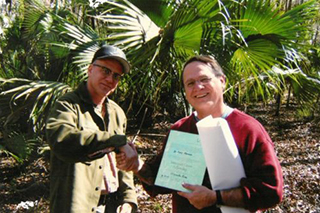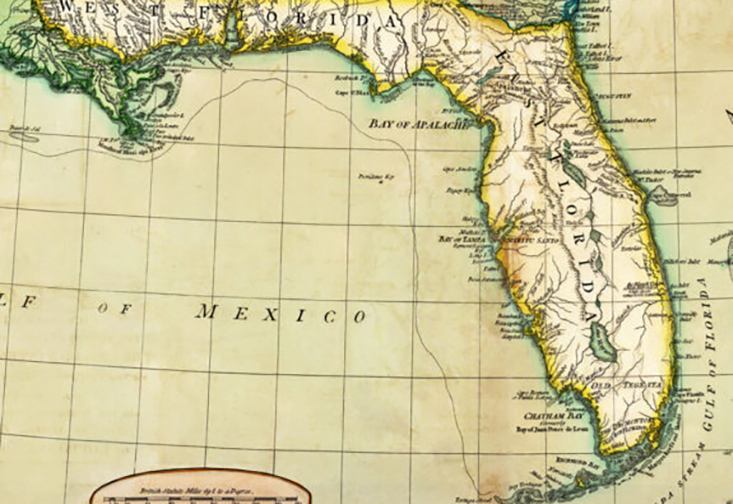As he neared the end of his life, Frank E. Duckwall began thinking about his legacy. A physicist turned successful businessman who ran an optics company in Tampa, he decided to create a foundation dedicated to making the Tampa Bay region a better place.
“When Mr. Duckwall passed in 1993, he gave nearly 99.5% of his estate to the Duckwall Foundation. I found a note that he hoped there would be $1.5 million in the foundation, when in fact there was $8.5 million in his various investment accounts,” said Sandy Rief, the executor of Duckwall’s estate. “Following his wishes, what we tried to do over the years is invest in things that have permanence and would benefit a lot of people over a long period of time in the community.”
Funding from the Duckwall Foundation has helped support maternity programs, performance studios and college scholarships from Polk to Sarasota County and everywhere in between. It has also played a vital role in supporting some of the most innovative and cross-disciplinary research on Florida history and studies. Most notably was the creation of the Frank E. Duckwall Professorship, currently a two-year rotating professorship given to faculty who teach in the unique Florida Studies Program at USF St. Petersburg.
“The whole idea of the Professorship was to foster the teaching of Florida history to develop greater awareness on both the role Florida played in the discovery of North America and that there was a lot going on in the state before Walt Disney and the mouse (Mickey) came,” said Rief.
Today, more than 20 years after the Frank E. Duckwall Professorship was created, groundbreaking work continues to be done in his name. The newest recipient of the Duckwall Professorship is Thomas Hallock, a Professor of English at USF St. Petersburg. Hallock, who specializes in early American literature, plans on offering new courses and research opportunities for students with the new appointment.
During the Spring 2019 semester, Hallock will teach on the history and literature of Booker Creek, an urban watershed that flows through historic neighborhoods in St. Petersburg, FL.
“There is just one Florida Studies Program on the entire planet – and its brings together students and scholars from a variety of background and interests to come at the topic of Florida,” said Hallock. “You can do anything with Florida as a springboard.”
The connection between the Professorship and Florida Studies began in 1997, when more than $250,000 went into an endowment to promote Florida history via research, conferences and teacher workshops. Gary Mormino, then a Professor in the Department of History at USF Tampa, became the first to hold the title.

A prolific writer on modern Florida history and politics, Mormino held the Duckwall Proffesorship for nearly 15 years, during which he wrote his seminal work “Land of Sunshine, State of Dreams: A Social History of Modern Florida.” The book went on to win the Charlton Tebeau Prize from the Florida Historical Society in 2006 and was described as “the book by which all future studies of modern Florida will be measured.”
“The Duckwall endowment was a big deal, because at the time it was the first professorship in the history of any USF History Department, system-wide,” said Mormino.
In 2009, Mormino moved to USF St. Petersburg to join the Florida Studies Program. The professorship went with him, marrying the endowed professor focused on promoting Florida history with a program that explores the state’s fascinating story and changing identity.
The Florida Studies Program brings together faculty from history, economics, geography, political science and other disciplines to generate an in-depth, cross-disciplinary exploration of Florida. With Florida as the glue, courses and research as diverse as Florida springs, Spanish paleography and sports and American culture give students the full breadth of knowledge associated with the Sunshine state.
Some of the major initiatives faculty and students are involved in through the program include La Florida: The Interactive Digital Archive of the Americas that is bringing to life the critical events and diverse melting pot of people that made up early Spanish Florida; and the Initiative on Coastal Adaptation and Resilience, which each year puts on a workshop that brings together agencies and individuals working on issues like hurricanes, climate change and sea-level rise and focuses attention on how to make communities better able to withstand large-scale impacts.
Students can earn a Master of Liberal Arts in Florida Studies. Other students benefit from Florida Studies courses as they prepare for careers from urban planning to international business.
In 2012, with Gary’s impending retirement, the endowment changed into a two-year rotating professorship among the faculty in the program.
“We saw this arrangement as a great way to spread the wealth, providing funding for Florida research to a variety of professors and their students from different academic backgrounds, which would lead to new perspectives on the study of Florida,” said Mormino.
Funding has been used by faculty and students in attending and presenting at academic conferences, putting on workshops at USF St. Petersburg and spearheading research whose work directly uncovers and promotes Florida history.
Along with Mormino and Hallock, others who held the prestigious Duckwall Professorship include Christopher Meidl, Chair of the Florida Studies Program and Professor of Geography who focuses on environmental geography and water resources, and Rebecca Johns, an Associate Professor of Geography with a focus on local problems related to Florida’s social and environmental landscapes such as food deserts.
Students who participate in Hallock’s course this year will produce a book of short stories, essays and other works on the Booker Creek watershed. The following Spring semester, he will offer a course on the work of Cervantes’ “Don Quixote”, Alonso Gregorio de Escobedo epic poem “La Florida” and the first account of the Hernando de Soto expedition, which were all finished around the exact time in the early 17th century.
“I can look at the whole span of early American literature through the lens of Florida,” said Hallock. “For example, in 1528, Alvar Nunez Cabeza de Vaca wrote the oldest literature in what would become the United States, chronicling a Spanish expedition in Tampa Bay. American literature begins here.”
More than 20 years after its establishment, the Duckwall Professorship and the Foundation that supports it continues to invest in research and new ways of looking at Florida’s history and present.
“The Duckwall Foundation is extremely proud of its partnership with the Florida Studies Program,” said Rief, “and will continue to support initiatives that make the history and study of Florida more prominent and widely known.”
